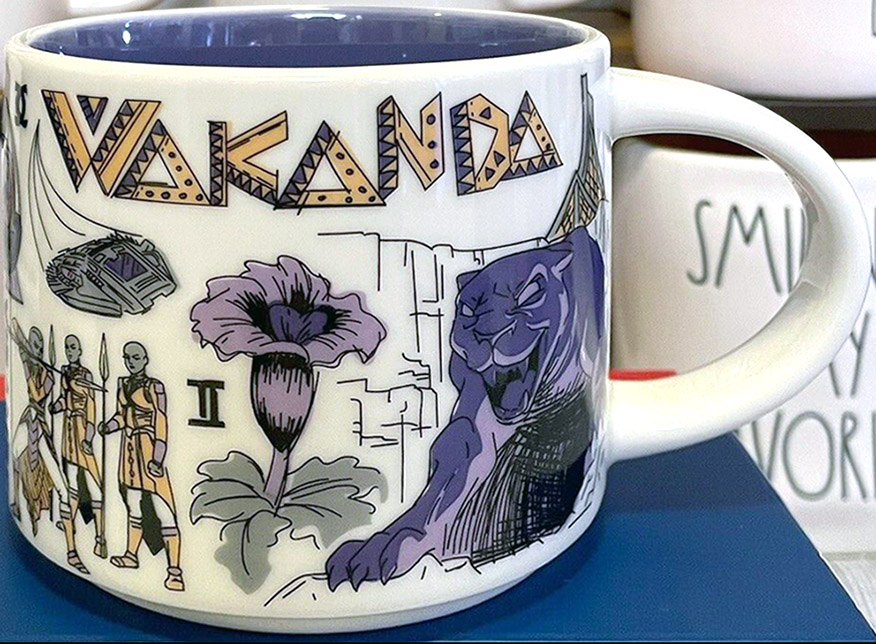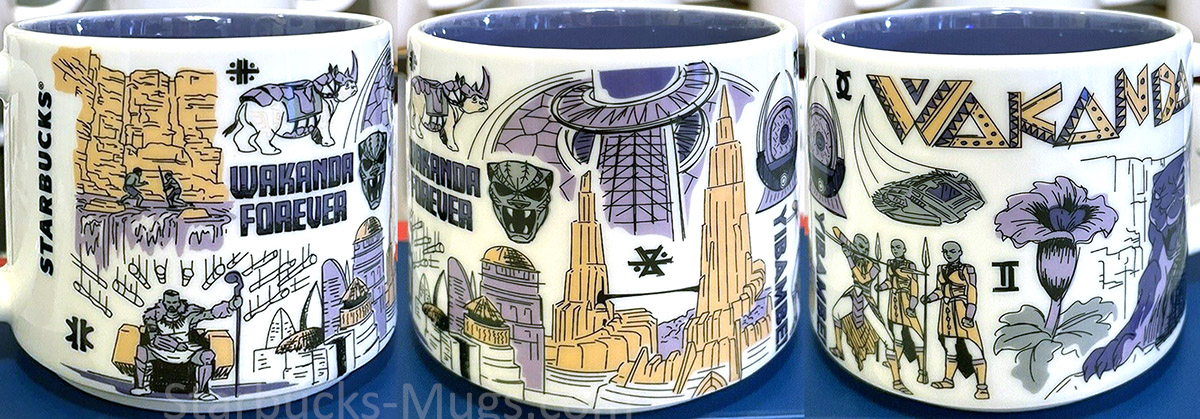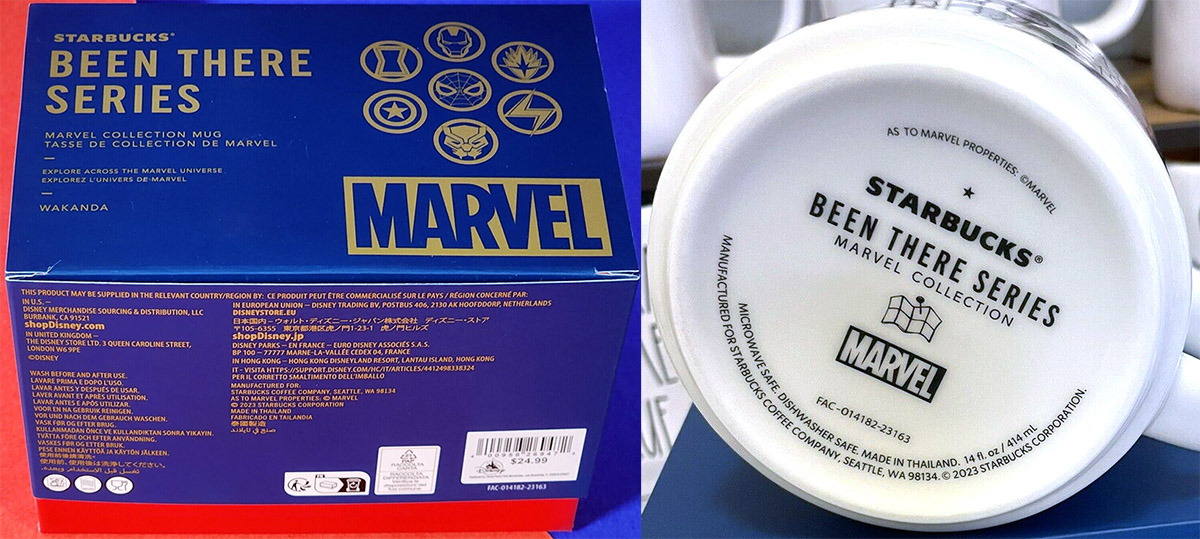
Been There Marvel – Wakanda
This is a milestone release from Starbucks and I am sure, that Been There Wakanda is just the first from the new collection of Marvel mugs that are coming soon.
As you can see from the pictures below, the box has an unique design. Even though it’s similar to Star Wars boxes, with each of them having the name of the mug specified, here are some things specific to this new release:
– the cover of the box has a distinctive shade of dark blue, while the box itself is red.
– we can see other MCU inspired icons just above the MARVEL logo, namely Iron Man, Guardians of the Galaxy, Ms. Marvel, Black Panther, Captain America, Black Widow and Spider Man in the center. This gives us a hint about the possible new releases.
– the “Marvel Collection Mug” wording is dubbed in French as well. As a reminder, the early Star Wars releases had only English wording used, while the latest releases had it in 3 languages (English, French and Spanish).
With that being said, it is very important to double check if the cover of the box is matching the mug whether you’re buying it at the Starbucks store or 3rd party. Yes, we only have Wakanda mug for now, but if (or when) Starbucks releases more, that warning is going to make more sense.
As per the name of the mug, it is dedicated to Wakanda, which resonates with mystery, innovation, and cultural vibrancy, that has captured the imagination of audiences around the world through its depiction in the Marvel Cinematic Universe. This fictional African nation, introduced in the pages of Marvel Comics, has evolved into a symbol of Afrofuturism and empowerment, weaving together technology, tradition, and an unwavering spirit.
Nestled discreetly within the heart of Africa, Wakanda is portrayed as a nation untouched by colonization and exploitation due to its abundant reserve of vibranium, a fictional super-metal with extraordinary properties. The advanced technology harnessed from vibranium sets the stage for Wakanda’s unique blend of tradition and progress. In the films, it’s brought to life through visually stunning landscapes, intricate designs, and the magnificent cityscape of Birnin Zana.
Wakanda’s cultural identity is a reflection of its African roots and forward-looking vision. Drawing inspiration from diverse African cultures, the nation showcases a rich tapestry of languages, art, fashion, and customs. This fusion of past and future is a central theme, often exemplified by the character of T’Challa, the Black Panther and Wakanda’s king. As both a guardian of tradition and an advocate for change, T’Challa embodies the nation’s complex ethos.
Furthermore, Wakanda’s role as a formidable global player is explored through its diplomatic and humanitarian endeavors. The country’s decision to maintain secrecy to safeguard its resources mirrors historical realities, where colonial powers exploited African nations for their wealth. However, Wakanda’s eventual opening up to the world signifies a willingness to share its advancements for the greater good.
The people of Wakanda possess a profound sense of spirituality, centered around their devotion to the Panther God. Within this belief system, the embodiment of the Panther God is the Black Panther – a proficient warrior hailing from the royal lineage. This individual is granted the privilege of consuming the Heart-Shaped Herb, bestowing upon them extraordinary abilities like superhuman strength, remarkable speed, and unparalleled agility. We can see both the Panther God and the Heart-Shaped Herb on the front of the mug, below its name.
The three warriors next to the flower are the Dora Milaje. These fiercely skilled and loyal warriors are an all-female special forces unit, dedicated to safeguarding the nation and its royal family. With their exceptional combat prowess, unyielding dedication, and distinctive ceremonial armor, the Dora Milaje serve as the embodiment of Wakanda’s strength and honor. As the protectors of the throne, they exemplify unwavering loyalty to their duty and traditions, making them an integral part of Wakanda’s rich cultural and military heritage.
The two skyscrapers and the skyline of the city seem to be the Golden City, a.k.a Birnin Zana, the capital of the Kingdom of Wakanda.
We can see the throne room of M’Baku, on the back of the mug. Currently reigning as the King of Wakanda and at the helm of the Jabari Tribe, King M’Baku governs those who chose to detach from mainstream Wakandan society. Initially a strong antagonist to T’Challa’s rule, M’Baku later finds himself at a crossroads, torn between challenging T’Challa’s throne and uniting forces to repel the threat posed by Erik Killmonger. Recognizing the grave danger that Killmonger represents, M’Baku opts to save T’Challa’s life, marshals his armies to help vanquish Killmonger, and is rewarded with a position on the Tribal Council.
In subsequent events, M’Baku takes an active role in safeguarding Wakanda against the formidable Outrider army of Thanos. Although successful in neutralizing Thanos’ forces, they fall short in preventing his acquisition of the six Infinity Stones. M’Baku endures the Snap’s aftermath as one of the survivors. After the Snap’s reversal in 2023, M’Baku collaborates with the Masters of the Mystic Arts, joining the Avengers in the climactic Battle of Earth.
Following T’Challa’s demise, Wakanda faces the threat of the Talokanil, commanded by Namor. Responding swiftly, M’Baku calls for resolute action. In the face of a Talokanil assault on the Golden City, he provides sanctuary for refugees and stands alongside Shuri as the new Black Panther during the conclusive showdown against Namor. After Namor’s surrender and Wakanda’s return to normalcy, Shuri embarks on a global journey, prompting M’Baku to issue a challenge for the Wakandan throne, ultimately ascending as the new ruler.
In the context of the MCU, “Wakanda Forever” represents a sense of unity, pride, and homage to the fictional nation’s advanced technology, culture, and the concept of the Black Panther as a protector. It’s often used as a rallying cry or salute by characters and fans alike to honor the character’s impact and the broader themes of the film, which celebrated African culture, empowerment, and identity.
























































































Hello,
where did you buy the mug?
best,